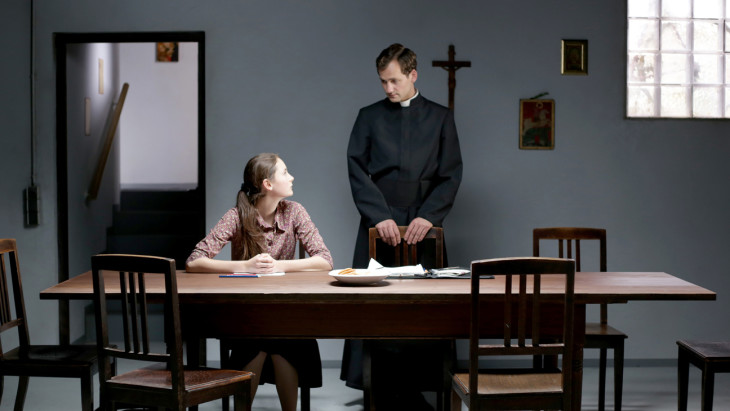In the seventh chapter of this modern Christian allegory, teenagers heatedly debate tolerance versus religious freedom (to discriminate) in their school’s gym class. Considering the recent signing of the Religious Freedom Restoration Act in Indiana and disturbing trends of religious infiltration in world politics, director Dietrich Brüggemann’s Stations of the Cross [Kreuzweg] feels especially urgent even if it was designed as an immutably potent critique.
At first glance, Stations of the Cross may appear to be a more talkative younger sister to Paweł Pawlikowski’s Ida (WFF 2014), recent Oscar-winner. But there’s minimal ambiguity here; its deeper fervor embedded into the static, single takes gawk at the incompatibility of archaic values of an ultra-conservative sect of Catholicism with looser standards of the modern secular world. Although the European female character studies of Ida (Poland in 1962) and Stations (Germany in 2014) each establish pious parallels, the latter emerges as a more pervasive and scathing indictment of fundamentalism and in living by an immovable doctrine, which is handled with a blunt satirical edge. A sense of resignation or martyrdom marks the divisive film’s premeditation that infatuates as often as it intimidates.
Best Screenplay winner at the Berlin International Film Festival, its dialogue is miraculously meticulous with an obvious knack for provocation through obsessive detail in the 14 designated chapter titles that creatively ruminate the stages of Jesus’ journey to Calvary as analogous to that of the film’s pale, saintly heroine, Maria Göttler (Lea van Acken). This is immediately evident in the opening scene, “Jesus is Condemned to Death” (a bleak prophecy indeed), where the intimidatingly eloquent Father Weber (Florian Stetter) of the Society of St Pius XII details the upcoming Confirmation ceremony to his pupils and instills within them the desire to resist temptation, and above all, sacrifice to make room in their hearts for the Lord. Stetter projects an unflappable confidence of faith, as he not once raises his voice or scolds the young teens. Most inquisitive among the group is 14 year-old Maria, who hangs back to ask Weber a question about the power of asceticism to restore her mute younger brother Johannes’ voice. Without inferring her more radical inclinations, the priest nobly compares her to Venerable Anne de Guigné and points her towards the possibility of pursuing nunhood.
But Maria seeks a path even more uncompromising, in possession of a rigid conception of sacrifice that appears to have become perverted from the onset. A combination of her mother (Franziska Weisz)’s word, the priest’s lecturing, and her own fearful insinuations about life have turned sacrifice into a cycle of self-abasement. “I simply don’t want to deal in superficial matters,” she remarks to her compassionate au pair, Bernadette (Lucie Aron). Maria’s aspiring virtue echoes from this second chapter through the remainder of her journey.

Most devastating is the attempted forge of a platonic relationship with a boy, Christian (Moritz Knapp), from her public school’s neighboring class. Stumped by his algebra homework in the library, Christian attempts to exchange a few words before reading a word problem concerning a choir, which is only a neat segue into discussion of his modern church choir’s repertoire of Bach chorales, gospels, and soul music. Sensing the opportunity to connect with someone devout in an approved setting, Maria, for once, embraces pure impulse emanating from love until her mother, assuming the worst about the influence of popular music’s “demonic rhythms,” catches wind of the plan.
If the leaden pacing and intensely dialogue-driven story become so severe that they might burden van Acken, her nuanced, sympathetic, and incredibly captivating performance overcomes. The awareness in which she portrays Maria perfectly mirrors the character’s sacrificial devotion. Critics often describe an actor or actress as “disappearing” into more eccentric, uncharacteristic roles, but the same could be written of van Acken vanishing into the unassuming young outcast whose innocence and inner conflict are, at times, curiously reminiscent of Dawn Weiner in Todd Solondz’s Welcome to the Dollhouse (1995).
It’s unfortunate that Brüggemann lobs a heightened level of mockery at the mother’s cruel stoicism until the bitter end. While the intent may have been to satirize zealotry, the director grimaces at her grim views, refusing to provide enough insight into her real motivations or history beyond the desire to hermetically protect Maria. Whether Stations of the Cross is ultimately received as a deeply demanding or moving experience, its rigorousness and lead performance do deserve certain high prays, err, praise.
- Stations of the Cross screens twice during the Wisconsin Film Festival as part of the “New International Cinema” series: at Sundance Cinema 1 on Sun, Apr 12 (4:30p) and again at Sundance Cinema 1 on Tues, Apr 14 (3:15p). Tickets are still available for both showtimes.

